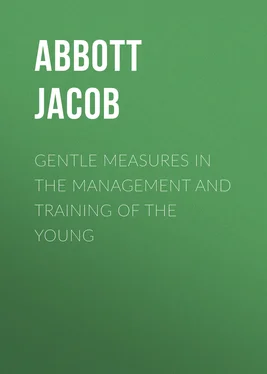Jacob Abbott - Gentle Measures in the Management and Training of the Young
Здесь есть возможность читать онлайн «Jacob Abbott - Gentle Measures in the Management and Training of the Young» — ознакомительный отрывок электронной книги совершенно бесплатно, а после прочтения отрывка купить полную версию. В некоторых случаях можно слушать аудио, скачать через торрент в формате fb2 и присутствует краткое содержание. Жанр: foreign_edu, pedagogy_book, upbringing_book, на английском языке. Описание произведения, (предисловие) а так же отзывы посетителей доступны на портале библиотеки ЛибКат.
- Название:Gentle Measures in the Management and Training of the Young
- Автор:
- Жанр:
- Год:неизвестен
- ISBN:нет данных
- Рейтинг книги:5 / 5. Голосов: 1
-
Избранное:Добавить в избранное
- Отзывы:
-
Ваша оценка:
- 100
- 1
- 2
- 3
- 4
- 5
Gentle Measures in the Management and Training of the Young: краткое содержание, описание и аннотация
Предлагаем к чтению аннотацию, описание, краткое содержание или предисловие (зависит от того, что написал сам автор книги «Gentle Measures in the Management and Training of the Young»). Если вы не нашли необходимую информацию о книге — напишите в комментариях, мы постараемся отыскать её.
Gentle Measures in the Management and Training of the Young — читать онлайн ознакомительный отрывок
Ниже представлен текст книги, разбитый по страницам. Система сохранения места последней прочитанной страницы, позволяет с удобством читать онлайн бесплатно книгу «Gentle Measures in the Management and Training of the Young», без необходимости каждый раз заново искать на чём Вы остановились. Поставьте закладку, и сможете в любой момент перейти на страницу, на которой закончили чтение.
Интервал:
Закладка:
By the gentle measures, then, which are to be here discussed and recommended, are meant such as do not react in a violent and irritating manner, in any way, upon the extremely delicate, and almost embryonic condition of the cerebral and nervous organization, in which the gradual development of the mental and moral faculties are so intimately involved. They do not imply any, the least, relaxation of the force of parental authority, or any lowering whatever of the standards of moral obligation, but are, on the contrary, the most effectual, the surest and the safest way of establishing the one and of enforcing the other.
CHAPTER III. THERE MUST BE AUTHORITY
The first duty which devolves upon the mother in the training of her child is the establishment of her authority over him—that is, the forming in him the habit of immediate, implicit, and unquestioning obedience to all her commands. And the first step to be taken, or, rather, perhaps the first essential condition required for the performance of this duty, is the fixing of the conviction in her own mind that it is a duty.
Unfortunately, however, there are not only vast numbers of mothers who do not in any degree perform this duty, but a large proportion of them have not even a theoretical idea of the obligation of it.
"I wish my child to be governed by reason and reflection," says one. "I wish him to see the necessity and propriety of what I require of him, so that he may render a ready and willing compliance with my wishes, instead of being obliged blindly to submit to arbitrary and despotic power."
She forgets that the faculties of reason and reflection, and the power of appreciating "the necessity and propriety of things," and of bringing considerations of future, remote, and perhaps contingent good and evil to restrain and subdue the impetuousness of appetites and passions eager for present pleasure, are qualities that appear late, and are very slowly developed, in the infantile mind; that no real reliance whatever can be placed upon them in the early years of life; and that, moreover, one of the chief and expressly intended objects of the establishment of the parental relation is to provide, in the mature reason and reflection of the father and mother, the means of guidance which the embryo reason and reflection of the child could not afford during the period of his immaturity.
Indeed, the chief end and aim of the parental relation, as designed by the Author of nature, may be considered as comprised, it would seem, in these two objects, namely: first, the support of the child by the strength of his parents during the period necessary for the development of his strength, and, secondly, his guidance and direction by their reason during the development of his reason. The second of these obligations is no less imperious than the first. To expect him to provide the means of his support from the resources of his own embryo strength, would imply no greater misapprehension on the part of his father and mother than to look for the exercise of any really controlling influence over his conduct by his embryo reason. The expectation in the two cases would be equally vain. The only difference would be that, in the failure which would inevitably result from the trial, it would be in the one case the body that would suffer, and in the other the soul.
Indeed, the necessity that the conduct of the child should be controlled by the reason of the parents is in one point of view greater, or at least more protracted, than that his wants should be supplied by their power; for the development of the thinking and reasoning powers is late and slow in comparison with the advancement toward maturity of the physical powers. It is considered that a boy attains, in this country, to a sufficient degree of strength at the age of from seven to ten years to earn his living; but his reason is not sufficiently mature to make it safe to intrust him with the care of himself and of his affairs, in the judgment of the law, till he is of more than twice that age. The parents can actually thus sooner look to the strength of the child for his support than they can to his reason for his guidance.
To aid in the development and cultivation of the thinking and reasoning powers is doubtless a very important part of a parent's duty. But to cultivate these faculties is one thing, while to make any control which may be procured for them over the mind of the child the basis of government, is another. To explain the reasons of our commands is excellent, if it is done in the right time and manner. The wrong time is when the question of obedience is pending, and the wrong manner is when they are offered as inducements to obey. We may offer reasons for recommendations , when we leave the child to judge of their force, and to act according to our recommendations or not, as his judgment shall dictate. But reasons should never be given as inducements to obey a command. The more completely the obedience to a command rests on the principle of simple submission to authority, the easier and better it will be both for parent and child.
Let no reader fall into the error of supposing that the mother's making her authority the basis of her government renders it necessary for her to assume a stern and severe aspect towards her children, in her intercourse with them; or to issue her commands in a harsh, abrupt, and imperious manner; or always to refrain from explaining, at the time, the reasons for a command or a prohibition. The more gentle the manner, and the more kind and courteous the tones in which the mother's wishes are expressed, the better, provided only that the wishes, however expressed, are really the mandates of an authority which is to be yielded to at once without question or delay. She may say, "Mary, will you please to leave your doll and take this letter for me into the library to your father?" or, "Johnny, in five minutes it will be time for you to put your blocks away to go to bed; I will tell you when the time is out;" or, "James, look at the clock"—to call his attention to the fact that the time is arrived for him to go to school. No matter, in a word, under how mild and gentle a form the mother's commands are given, provided only that the children are trained to understand that they are at once to be obeyed.
Another large class of mothers are deterred from making any efficient effort to establish their authority over their children for fear of thereby alienating their affections. "I wish my child to love me," says a mother of this class. "That is the supreme and never-ceasing wish of my heart; and if I am continually thwarting and constraining her by my authority, she will soon learn to consider me an obstacle to her happiness, and I shall become an object of her aversion and dislike."
There is some truth, no doubt, in this statement thus expressed, but it is not applicable to the case, for the reason that there is no need whatever for a mother's "continually thwarting and constraining" her children in her efforts to establish her authority over them. The love which they will feel for her will depend in a great measure upon the degree in which she sympathizes and takes part with them in their occupations, their enjoyments, their disappointments, and their sorrows, and in which she indulges their child-like desires. The love, however, awakened by these means will be not weakened nor endangered, but immensely strengthened and confirmed, by the exercise on her part of a just and equable, but firm and absolute, authority. This must always be true so long as a feeling of respect for the object of affection tends to strengthen, and not to weaken, the sentiment of love. The mother who does not govern her children is bringing them up not to love her, but to despise her.
Читать дальшеИнтервал:
Закладка:
Похожие книги на «Gentle Measures in the Management and Training of the Young»
Представляем Вашему вниманию похожие книги на «Gentle Measures in the Management and Training of the Young» списком для выбора. Мы отобрали схожую по названию и смыслу литературу в надежде предоставить читателям больше вариантов отыскать новые, интересные, ещё непрочитанные произведения.
Обсуждение, отзывы о книге «Gentle Measures in the Management and Training of the Young» и просто собственные мнения читателей. Оставьте ваши комментарии, напишите, что Вы думаете о произведении, его смысле или главных героях. Укажите что конкретно понравилось, а что нет, и почему Вы так считаете.












